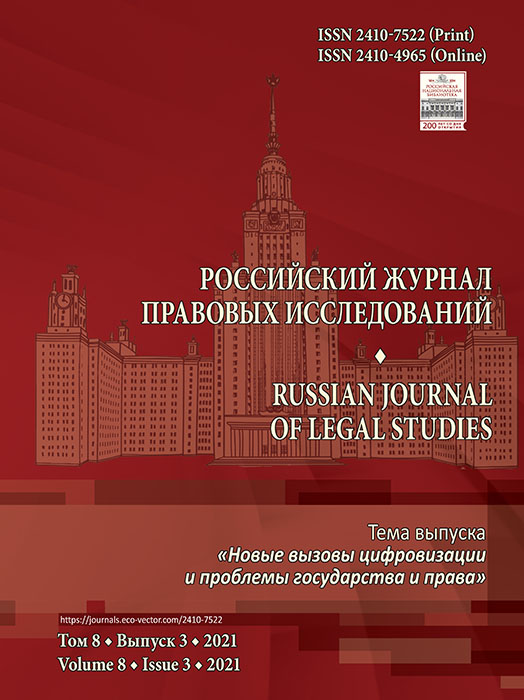Деятельность адвокатов в Международном уголовном суде: теоретический и практический аспекты
- Авторы: Седова Д.А.1
-
Учреждения:
- Всероссийский университет юстиции (РПА Минюста России)
- Выпуск: Том 8, № 3 (2021)
- Страницы: 67-72
- Раздел: Международно-правовые науки
- Статья получена: 07.09.2021
- Статья одобрена: 07.09.2021
- Статья опубликована: 07.10.2021
- URL: https://journals.eco-vector.com/2410-7522/article/view/79723
- DOI: https://doi.org/10.17816/RJLS79723
- ID: 79723
Цитировать
Полный текст
Аннотация
За всю историю человечества совершено большое количество актов насилия и агрессии. Только за последние 50 лет было более 400 межгосударственных и внутригосударственных конфликтов, унесших жизни миллионов людей. Все больше ощущалась острая необходимость в защите нарушенных прав индивидов. Не раз обсуждалась идея создания единого международного органа по защите прав человека. Впервые мысль о создании международного судебного органа была высказана в 1948 г. Генеральной Ассамблеей ООН после Нюрнбергского и Токийского процессов по окончании Второй Мировой войны, и этот вопрос с того времени обсуждался в Организации Объединенных Наций. Однако долгое время усилия по созданию такого механизма успехом не увенчивались, несмотря на необходимость постоянного уголовного суда для судебного преследования и наказания тех лиц, которые совершают наиболее серьезные преступления. И в 1998 г. эта идея получила свое воплощение. Международный уголовный суд (далее — МУС) стремился найти пути к миропорядку, справедливому разрешению конфликтов. «Уже давно было признано, — отмечается в приговоре Нюрнбергского трибунала, — что международное право налагает долг и обязанности на конкретных лиц так же, как и на государство… Преступления против международного права совершаются людьми, а не абстрактными категориями, и только путем наказания отдельных лиц, совершающих такие преступления, могут быть соблюдены установления международного права». Но важно отметить, что не все процессуальные вопросы решены. Актуальным вопросом на сегодняшний день является статус защитников обвиняемых в международном уголовном судопроизводстве. Этот вопрос требует не только доктринального, но и практического осмысления.
Полный текст
Об авторах
Дарья Алексеевна Седова
Всероссийский университет юстиции (РПА Минюста России)
Автор, ответственный за переписку.
Email: darya.sedowa@yandex.ru
SPIN-код: 9415-1484
бакалавр права
Россия, МоскваСписок литературы
- Печегин Д.А. Проблема сочетания состязательных и следственных начал при производстве по уголовному делу: поиск решения на примере Международного уголовного суда // Законодательство. 2015. № 2. С. 69–77.
- Печегин Д.А. Соотношение розыскного и состязательного начал в международных документах, регулирующих уголовное судопроизводство // Вестник Московского университета. Серия 11: Право. 2014. № 6. С. 50–59.
- Broomhall B. International Justice and the International Criminal Court: between sovereignty and the rule of law. Oxford, 2003. P. 93–101.
- Волеводз А.Г. Современная система международной уголовной юстиции: понятие, правовые основы, структура и признаки // Международное уголовное правосудие: Современные проблемы. 2009. С. 303–323.
- Владимирофф М. Рассуждения о статусе защитника в международных судебных разбирательствах. Режим доступа: https://academia.ilpp.ru/wp-content/uploads/2019/11/%D0%9C%D0%9F3-4-2012_%D0%92%D0%BB%D0%B0%D0%B4%D0%B8%D0%BC%D0%B8%D1%80%D0%BE%D1%84%D1%84.pdf
- Глотова С.В. Международный Уголовный суд в системе международной безопасности // Международное право – International law. 2007. №1 (29). С. 85-99.
Дополнительные файлы








